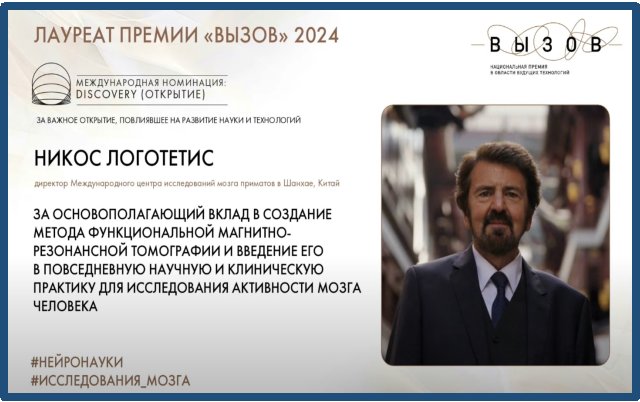We are delighted to announce the exciting news that Prof. Dr. Nikos Logothetis has been the first foreigner, who was awarded the highest Russian VYZOV Prize for Future Technologies.

The VYZOV Prize is designed to motivate and inspire distinguished scientists and technologists by honoring those, whose work has made notable strides in their research field. Details related to the VYZOV award can be found in the link: VYZOV - Annual National Future Technology Award.
The research of Prof. Dr. Logothetis has been considered indeed to be a "unique international resource" including both novel investigations of the neurophysiological underpinnings of generative perception, as well as development of multidisciplinary methods for the studies of brain systems.
Striking for systems neuroscience has been his combination of electrophysiology with fMRI, which - among others - allowed the very first insights into the nature of the Blood-Oxygen-Level-Dependent (BOLD) signal, i.e. regional changes in cerebral blood flow (CBF), cerebral blood volume (CBV) and blood oxygenation, all three reflecting local fluctuations of neural activity. The findings were the first to demonstrate that the fMRI BOLD contrast mechanism reflects the input and intracortical processing of a given region rather than its spiking output. In fact, increases in BOLD responses may occur simultaneously with strong decreases in the firing of projection neurons, as the activated inhibitory interneurons are metabolically very “expensive”. Decreases of the BOLD signal, on the other hand, often reflects reduction in multiunit spiking activity of projection neurons. Many such NKL-studies demonstrated that the fMRI signal cannot easily differentiate between function-specific processing and neuromodulation, between bottom-up and top-down signals, and it may potentially confuse excitation and inhibition.
Recently, Prof. Dr. Logothetis developed and employed also a novel methodology dubbed as NET-fMRI, i.e. Neural-Event-Triggered fMRI, which permits the study of the relationship of global multi-structure-activity patterns to local intrinsic events, such as hippocampal ripples, spindles, and PGO waves, all related to various types of learning, decision-making and memory. The aim has been to study and understand the mechanisms of Synaptic and System memory consolidation. He combined fMRI with multishank-multisite recordings in the hippocampus, thalamus and parabrachial nucleus (PBn), and made the utterly unexpected observation that the consolidation-related hippocampal ripples, are actually tightly associated with robust cortical activations that occur concurrently with a particularly intriguing strong inhibition of large portions of subcortical brain structures that are involved in neural plasticity, such as the basal ganglia, cerebellar cortex, and pons, the ascending reticular arousal system of which may be involved in synaptic consolidation. Surprisingly the PGO waves were found to have two distinct types occurring sequentially, and influencing selectively ripples and theta events respectively. These two types were associated with opposite hippocampal spike-field coupling, prompting periods of high neural synchrony of neural populations during periods of ripple and theta events. This entirely novel and surprising coupling between PGO waves and ripples, classically associated with distinctly different sleep stages, supports the notion that a global coordination mechanism of hippocampal sleep dynamics by cholinergic pontine transients may promote systems and synaptic memory consolidation, as well as synaptic homeostasis.
Not surprisingly, Prof. Dr. Logothetis’research produced over 500 publications, cited over 75000 times, with a h-index 124 and i10-index 371. Most importantly, his research in the Max Planck Institute for Biological Cybernetics produced over 60 alumni, who currently have professor positions in different continents.
Since 2022, Prof. Dr. Logothetis is the director of the International Center for Primate Brain Research, where he continuous enthusiastically his research in systems neuroscience. The“dream”of ICPBR is to study the brain as an adaptive Complex Dynamic System (CDS), with a capacity to change its environment-brought-forth reorganization under the influence of feedback mechanisms, including generative perception and various types of memory, all providing with resilience in the face of perturbation. This in turn implies that understanding and modelling brain-networks as adaptive CDS, requires concurrent monitoring of different brain-domains, as well as tracking of changes in their effective connectivity. One such approach is the aforementioned concurrent combination of functional MRI with invasive techniques that can directly assess the brain’s electrical and neurochemical activity, albeit correct interpretation of the signals also requires identification of brain structure-specific hemodynamic responses, which permit the estimation of neural signals from deconvolved fMRI time series.
Scientists in the ICPBR will further develop and apply methods that would ultimately define systems and subsystems, and permit the definition of brain states, transition dynamics between multiple steady sates, phase space neural networks, nonlinear spatiotemporal interactions between large number of components, and ultimately the selection of processes reflecting the self-organization level that may be related to various cognitive capacities of primates.